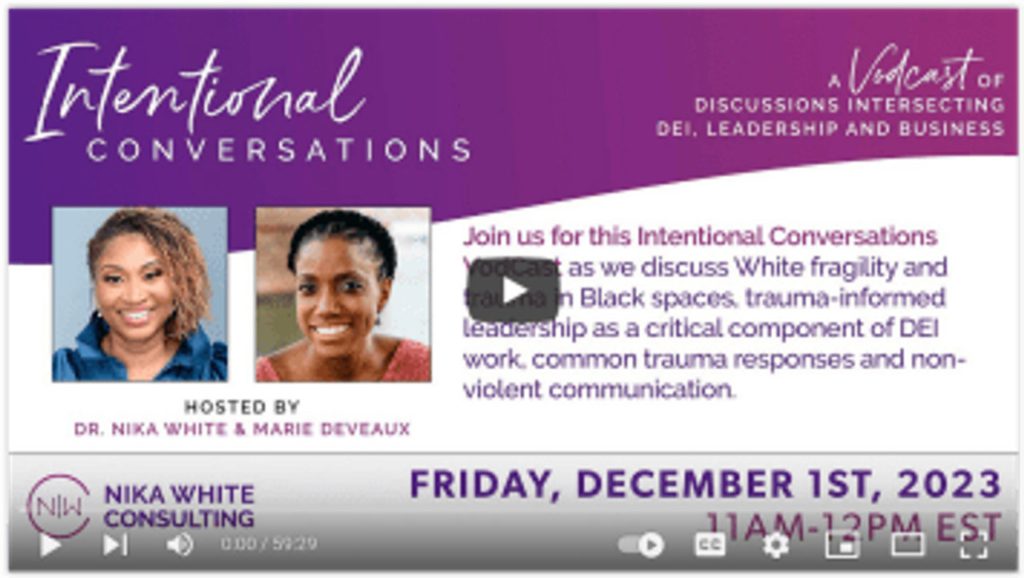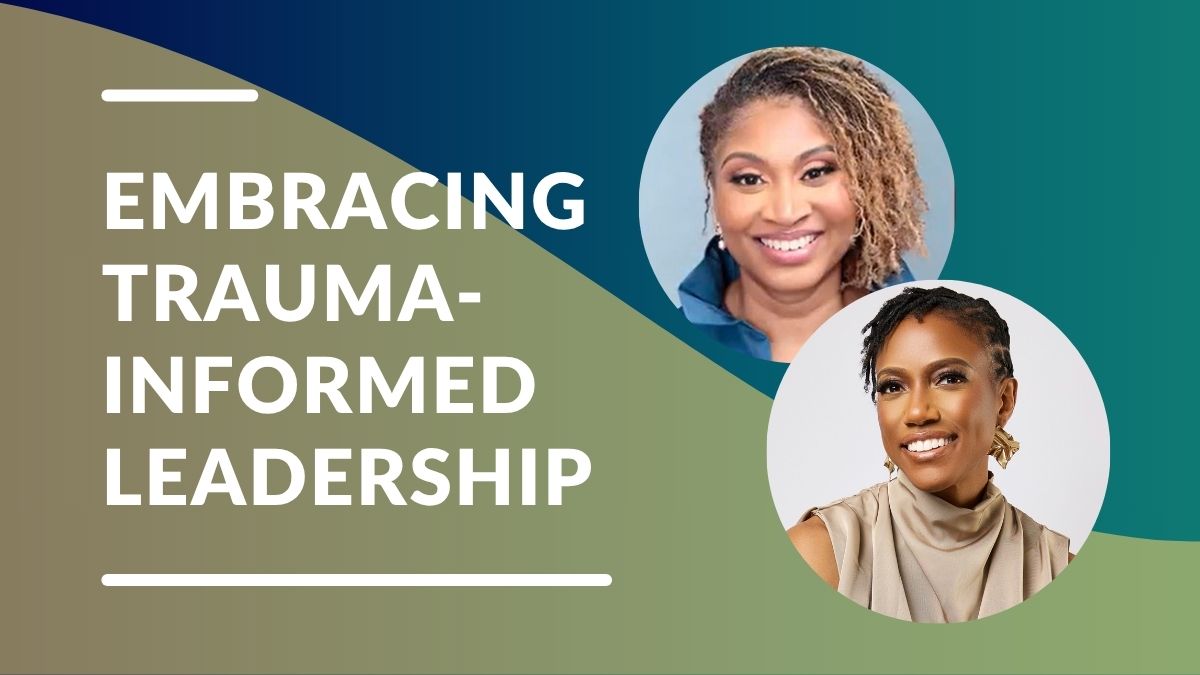I recently had the pleasure of co-hosting an intentional conversation with Dr. Nika White on her vodcast about trauma-informed leadership and nonviolent communication. The conversation was live-streamed on LinkedIn, so make sure to catch the replay on YouTube or wherever you stream podcasts.

Our conversation evolved from exploring my own experiences with workplace trauma to how we can rectify that with trauma-informed leadership, inclusive leaders, and the power of nonviolent communication. I, of course, could talk about any three of these topics for hours on end. But, most importantly, our dialogue underscored the need for more empathic and compassionate conversations in our workspaces.
Understanding Workplace Trauma:
Often our experiences of trauma illuminate a path forward. I was careful to articulate in my conversation with Nika, and with all those who enter into High Tides learning experiences, that when we talk about trauma, we’re talking about it with a lowercase ‘t’. Oftentimes, in the clinical setting, trauma refers to physical or sexual violence, but when we talk about everyday trauma at work and in life, often we’re talking about the damage that’s done psychologically and emotionally when we’re engaging in everyday experiences. Yes, threats to our psychological safety are forms of this type of trauma. These can be occurrences that unhinge our sense of safety and well-being. Recognizing this nuance is a critical distinction for leaders at any level.
Self-Validation and Empowerment:
When we experience trauma in the workplace, or when people seek to undermine our sense of well-being, sense of self, or minimize aspects of our identity, it’s important to come back to self-validation, especially for BIPOC employees or those who identify with other marginalized groups. When your environment does not recognize your worth and refuses to validate your contributions, the responsibility is yours to take up. You have to remind yourself that your experiences are of value and that what you bring, and the truth that comes with it, is of great worth. When others attempt to make you feel small or diminish your contributions, you have to remind yourself of your greatness, your gifts, and your talents, and most importantly, not allow the insecurities of others to dim your light.
“Your experiences are real and the value you bring is real, so remind yourself of that when others make you smaller.”
Impact of Workplace Trauma:
Workplace bullying and harassment are types of trauma that directly impact our mental health, and often the recovery time from these instances can vary from anywhere from a couple of weeks to several months or years. This means if we’re truly putting ourselves as the number one priority, we must engage in restorative practices that help us to bring awareness and regulation to both our mental state as well as our nervous system.
Inclusive Leadership:

When it comes to inclusive leadership, it’s important for all leaders to recognize the experience of trauma. We not only need to empathize with other human beings in our space as part of understanding how hurt impacts all of us. But it also gives us an opportunity to share responsibility for everyone’s wellness by acknowledging the hurt that’s present in everyone’s life experience. We get to foster a culture of understanding and ultimately support for workers holistically. In this vein, it’s also important to remember that we are not defined by our experiences; our identity transcends the trials we endure. You don’t have to fear being an angry black woman if you understand that you are a black woman who is experiencing anger in response to your environment.
Organizational Accountability:
At the organizational level, ways of addressing harassment, trauma, or even microaggressions also offer an opportunity for accountability. The burden of resolving toxic workplaces cannot successfully fall on the shoulders of those who bring attention to them. Notably, in the DEI sphere, people who are often at the forefront of this work are those who have also been the most marginalized in terms of their intersecting identities. It’s not fair to continue to ask those who are processing the most mental and psychological hurt to also be the only ones responsible for changing and addressing how that hurt is being enacted throughout an environment.
Empowering Questions:
Two powerful questions that can help change the dynamic in traumatic workplaces are:
Number one, “How can I acknowledge you?” This is one of my favorite phrases to offer at the conclusion of a coaching session, and no matter the level of the leader whom I’m speaking to, it continues to take people off guard. It is unfortunate that in this day and age, people don’t often hear enough of an offer to be acknowledged, seen, witnessed, and observed. This is a powerful tool that you can take to other leaders, social workers, coaches, and activists who are doing a lot of emotional labor to hold spaces for those who are victims of emotional and psychological harm.
The second question that we can offer is, “What do you need?” In this way, we make ourselves available to being responsive to the needs of others. Nonviolent communication teaches us that once we’re able to observe our environments free from judgment, it creates an opportunity to also acknowledge and address unmet needs. But how often do we have an inkling that someone’s not having all of their needs met and we just avoid the question altogether? By asking explicitly what people need, we create space for them to have permission to have needs without shame but actually have those needs addressed.
Nonviolent Communication and Emotional Intelligence:

Those who practice nonviolent communication understand that owning our own triggers is the first step to empowerment. Once we become more adept at our self-awareness and self-regulation when it comes to emotions, triggers, and our responses, we can be even more effective at addressing and empathizing with what others are experiencing. From this lens, we also understand trauma-informed leadership from an aspect of emotional intelligence or EQ. Just think, if two hurt individuals who have been traumatized in some way are attempting to address discord, the situation can only escalate and essentially deteriorate if neither party has the capacity to self-regulate. So before you do your own bias checking or seek to call out someone for a toxic workplace, consider, “Am I grounded enough in who I am that I can absorb the aggression or triggered response that someone else is having?” If not, it’s okay to acknowledge that. Again, if our first responsibility is to ourselves, it’s also in recognizing our capacity moment to moment for dealing with others’ emotional responses. This level of self-acknowledgment and regulation is a sign of strength.
The Cornerstone of Nonviolent Communication:
The cornerstone of my conversation with Dr. Nika really centered around the tenets of nonviolent communication. It is a dialogue framework that was fostered in the 1970s by Dr. Marshall Rosenberg and continues to be a foundation of High Tide’s work. When we think about effective communication and DEI-informed leadership through NVC, we think about not just an idea of being non-confrontational but actually of how we get to lean into discomfort and foster dialogues that are rooted in empathy, understanding, and respect. It’s a way of choosing to observe without judgment (something coaches are very good at), while also creating an opportunity to express our feelings and needs clearly. In this way, we make requests instead of demands of what it is that we need from our spaces, something that happens in the healthiest of workplaces. The journey towards becoming trauma-informed and adopting nonviolent communication isn’t just a leadership skill. It’s really a life skill that enhances our interactions.
I love teaching effective communication through a DEI lens because we get to help people with a toolkit that they take with them everywhere. By acknowledging trauma that’s present in everyday situations and practicing self-validation and embracing more empathetic communication, we pave the way for more resilient work environments. If you’re interested in this topic or about how to curate and hold more psychologically safe spaces for your clients or the teams that you work with, I encourage you to look into our facilitator certification program. We have another cohort coming up in just a few short months and we would love to host you. Visit the High Tides Facilitator Certification Program to learn more.





0 Comments